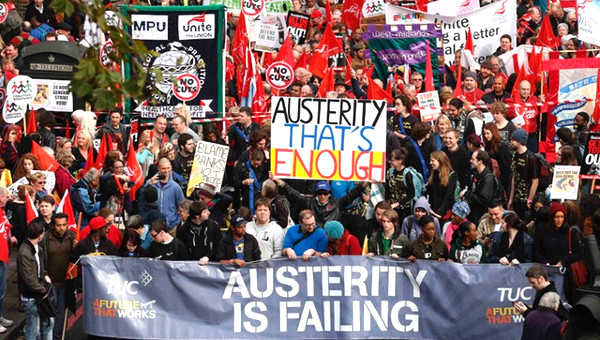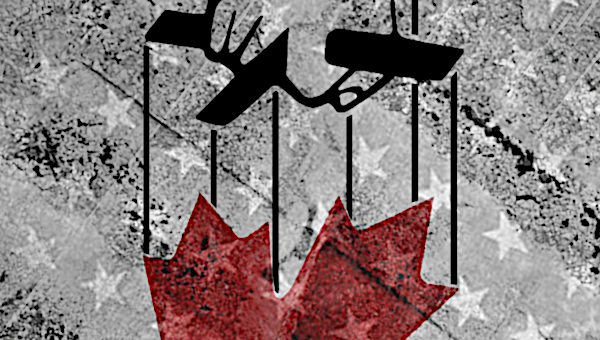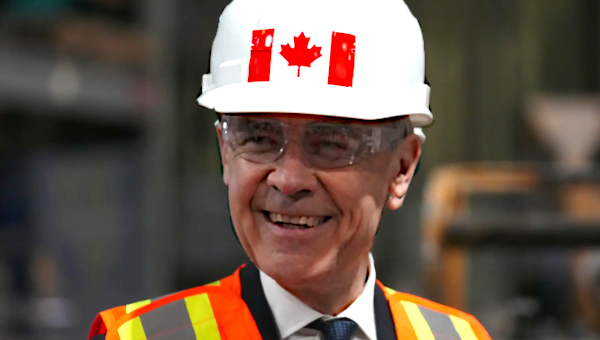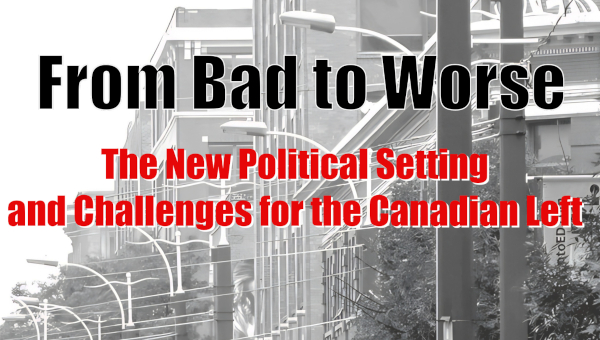Coronavirus, Crisis, and the End of Neoliberalism
Suddenly, we find ourselves in a transformed world. Empty streets, closed shops, unusually clear skies, and climbing death tolls: something unprecedented is unfolding before our eyes.
News about the economy is alarming almost everywhere: the COVID-19 pandemic has triggered the sharpest and deepest economic contraction in the history of capitalism. To paraphrase The Communist Manifesto, all that was solid has melted into air: ‘globalization’ has gone into reverse; long supply chains, which were previously the only ‘rational’ way to organize production, have collapsed and hard borders are back; trade has declined drastically, and international travel has been severely constrained. In a matter of days, tens of millions of workers became unemployed, and millions of businesses lost their employees, customers, suppliers, and credit lines.1

Several economies expect contractions of GDP to be measured in double digits, and a long line of sectors begs governments for a bailout. In the UK alone, banks, railways, airlines, airports, the tourism sector, charities, the entertainment sector and universities are on the verge of bankruptcy, not to speak of the displaced workers and the (nominally) self-employed, who lost everything because of an economic shock that has not yet even been felt in full.2
Half-Baked Keynesianism
The political implications are uncertain. Ideologically, neoliberal discourses about the imperative of ‘fiscal austerity’ and the limitations of public policy have vanished. Principled Austrians and neoliberals of every hue hastily retreated into a half-baked Keynesianism, as they tend to do when economies tank: at the time of need, the first to grab the capacious teats of the Treasury wins the big prize, and state intervention is questioned only for what it has not yet done. The private sector and the media beg for government spending, and portentous preachers of the ‘free market’ rush to the TV screens to plead for unlimited public spending in order to save private initiative. No doubt they will get back to normal when circumstances change and memories fade. At that point, the state will become ‘bad’ again, and public services will be ready for another round of culling. In the meantime, neoliberalism finds itself bereft of ideologues, while the irate fringe of anti-vaxxers, flat-Earthers and religious fanatics has been reduced to denying the pandemic itself, at great personal risk,3 peddling miracle cures based on unproven remedies, or praying and fasting together with Brazil’s President Jair Bolsonaro.4 May the Lord save us from them.
Shockingly, the epidemic itself was not unexpected. For decades, civilian and military strategists have considered a wide variety of scenarios, especially since the experiences with HIV in the 1980s, SARS in 2003 and, more recently, Ebola, and other ‘new’ diseases.5 The likelihood of a flu-type virus emerging in the animal markets in the South of China was well known.6 It follows that the crises of public health and the economy were not caused by failures of planning; instead, they reflected political choices, the dismantling of state capacities, staggering failures of implementation, and a shocking underestimation of the threat – for which, surely, reputations must be destroyed and heads must roll, as part of a systemic reckoning.7 For several weeks in early 2020 China bought the world time to prepare for the epidemic, and offered an example of how to confront it. Other East Asian governments came up with (more or less intrusive) policy alternatives, especially Singapore, South Korea, Taiwan and Vietnam, and they were highly successful. Meanwhile, the West fumbled: faced with a problem that could not be resolved by sanctioning, blockading or bombing a distant land, the governments of the wealthiest countries in the world did not know what to do. Unsurprisingly, the UK and US governments fared especially badly, while the EU has, once again, disappointed at an hour of need.8
Although the magnitude of the implosion of several economies – centred in the advanced Western countries – was unprecedented and is bound to have long-term consequences for the operation of capitalism, COVID-19 did not hit a prosperous global economy. In early 2020, the world was already enmeshed in a ‘great stagnation’ that had followed the 2007 Global Financial Crisis (GFC); even the best-performing large Western economy, the USA, was noticeably slowing down. This is not to minimise the magnitude of the hurricane, since any economy would have been overwhelmed; however, since COVID-19 hit fragile countries, it immediately exposed their vulnerabilities.
The pandemic hit after four decades of neoliberalism had depleted state capacities in the name of the ‘superior efficiency’ of the market, fostered deindustrialization through the ‘globalization’ of production, and built fragile financial structures secured only by the state, all in the name of short-term profitability. The disintegration of the global economy left the most uncompromisingly neoliberal economies, especially the UK and the USA, exposed as being unable to produce enough face masks and personal protective equipment for their health personnel, not to speak of ventilators to keep their hospitalized population alive. At the same time, service provision has been transformed beyond recognition, with online work becoming the norm in countless areas in a matter of days, rather than the years that this transition would have normally taken, while the neoliberal worship of consumption dissolved into undignified scrambles for hand sanitiser, pasta and sardines, and fistfights for toilet paper.
Neoliberalism was quickly shown to have hollowed out, fragmented and part-privatized health systems in several countries, while it also created a precarious and impoverished working class that is highly vulnerable both to disruptions in their earning capacity, and to health scares because of their lack of savings, poor housing, inadequate nutrition, and work patterns incompatible with healthy lives.9 In the meantime, the destruction of the social-democratic left had rendered the working class politically unprotected. These processes culminated in unseemly commotions for (state-led) Chinese output, in which the USA has increasingly behaved like a crazed bully, stealing the masks and ventilators that it could neither produce nor buy, and insulting weaker countries to boot.10
Human encroachment upon nature may have created the problem in the first place,11 but there is no doubt that the destruction of collectivity under neoliberalism exacerbated the impact of the pandemic. Emblematically, neoliberalism has devalued human lives to such an extent that valuable time was wasted in several countries – notably those with more uncompromisingly right-wing neoliberal administrations: the USA, the UK and Brazil – with government attempts to impose a strategy of ‘herd immunity’ that would inevitably eliminate the old, the weak and those with fragile health (which might alleviate their ‘burden’ on the fiscal budget),12 as opposed to imposing a lockdown that, although proven to reduce the loss of life, would hurt profits as well as (shock, horror!) showing that states can play a constructive role in social life. Eventually, mass pressure and the evidence of success in China and elsewhere forced even the most reluctant governments to impose lockdowns, but sometimes only partially and hesitantly, and those decisions always risked being undermined by mixed messages and incompetent implementation. In these countries, testing also tended to be restricted and health service staff were often left to cope with unmanageable workloads without adequate protection. This approach to the pandemic will lead to many thousands of unnecessary deaths for no purpose.13
In the UK, the shambolic administration led by the ever-unreliable Boris Johnson found itself confronting two evils: on the one hand, mounting estimates of deaths and, on the other hand, ever-worsening estimates of the potential drop in GDP. Pressed early on by the Conservative Party and by some of the most vocal business supporters of Brexit,14 the UK government wheeled out their ‘medical experts’ to justify the protection of profits and the idea of a ‘small state’ in the name of science. Yet, faced with an increasingly angry public opinion, the government turned around dramatically in mid-March but, by then, it was already too late. Because of the government’s earlier choice to delay action, their lack of preparedness and mind-boggling ineptitude, the UK would inevitaly end up in the worst of both worlds: countless dead (literally countless, since there has been a deliberate effort to under-report the loss of life),15 and economic losses in the hundreds of billions of pounds.16
The social implications of the pandemic emerged rapidly, for example, through the differential ability of social groups to protect themselves. In brief, the uber-rich moved into their yachts, the merely rich fled to their second homes, the middle class struggled to work from home in the company of over-excited children, and the poor, already having worse health, on average, than the privileged, either lost their earnings entirely or had to risk their lives daily to perform much praised but (needless to say) low-paid ‘essential work’ as bus drivers, care workers, nurses, porters, shopkeepers, builders, sanitation officers, delivery workers, and so on; meanwhile, their families remained locked up in cramped accommodation. It is not surprising that poor and BAME people are dramatically over-represented in the death statistics.17
In response to the shock, many governments dusted off the economic policies implemented after the GFC, but they rapidly proved to be insufficient: this economic collapse is much more comprehensive, the crisis will be much bigger, and bailouts will be much more costly than ever before.18 Unprecedentedly, Central Banks have started to provide direct finance to large companies: essentially they are handing selected capitalists ‘helicopter money’ (which, in some cases, was immediately transferred to shareholders as dividends).19 To disguise the unseemly spectacle of billionaires, often tax exiles, begging for subsidies from the same exchequer that they had previously evaded, some governments have promised to support the incomes of the workers, but usually through their employers rather than directly. In the USA, the federal government will send a one-off measly cheque (pointedly signed by D. Trump himself) to all households in order to disguise the staggering handouts being offered to capital, starting with an unprecedented $2-trillion (US) lifeline that is bound to escalate as the shutdown continues to hurt profits and the Presidential election approaches.
If the economic implications of the pandemic are certain to be catastrophic, the political implications cannot be anticipated precisely. In the UK, the pandemic unmasked the Conservative Party (and, at a further remove, the ill-fated Coalition government and its predecessor, New Labour), for having attacked social resilience and systematically ground down the NHS.20 Even when money was spent in the health service, as was the case during New Labour, the goal was to disorganize and slice up the NHS, introduce competition regardless of cost, hollow out the service and privatize whatever could be sold off, in order to increase the health system’s reliance on the profit motive.
With the pandemic, Conservative sermonizing about the imperative of ‘fiscal austerity’ was obliterated by the evident capacity of the state to create money from nothing and deliver salvation to selected sectors, as long as they were deemed to be ‘essential’ (which, consequently, was not the case for housing, health, employment and so on). At the same time, the ideology of individualism was shown to be a fraud because, although there can be individual flight from the virus, there can be no individual solutions to the catastrophe: one person alone can never be safe from an epidemic or nursed when they fall sick, and who but the state is going to contain the economic meltdown, secure income flows when the economy seizes up, enforce the lockdown, and resource the health service? As the left had always known and the UK Prime Minister was forced to recognise, there is, after all, such a thing as society.21 And the inhumanity of capitalism’s profit imperative was unmasked through the mass rejection of its favoured policy of ‘herd immunity’, with its consequent decimation of the non-workers.
The Left
We can now focus on what the left can press for. First is to learn the lessons. The health crisis and the economic collapse in the West, compared to much more efficient responses in the East, have demonstrated that radically neoliberal administrations are unable to perform the most basic functions of governance: to protect lives and secure livelihoods. The pandemic is also likely to be a marker in the transfer of hegemony from West to East. It is plain to see – and cannot be forgotten – that centralized and capable states (whether more or less democratic – the experience shows that political regime has little to do with policy competence) and a sophisticated manufacturing base matter for peoples lives and that, when the chips are down, borders can be closed and friends disappear.
Second is the imperative to secure life itself. States must secure jobs, incomes and basic services, including the rapid expansion of the health system. This is not merely for reasons of economic policy, but as part of efficient health policies: guaranteed jobs and incomes will make it possible for more people to stay at home, which will ease the load on the health system, speed up the end of the pandemic and accelerate the recovery.22 In order to do this, the banking system should be nationalized to secure the flow of credit and prevent speculation, and Central Banks should ensure that there is enough liquidity to keep the economy afloat. Key services should be taken over by the state to ensure that basic needs are served and, if the central authorities can give tens of billions to the airlines, the railways and supermarket chains, the public might as well own them.23

Third is to consolidate the rediscovery of collectivity and the irreducible sociability of the human species that has emerged through the strains of the crisis. The left must stress that the economy is a collective system (‘we are the economy!’), that we are bound together as humans, and that public services are essential. This could pave the way for a progressive alternative to (a by now clearly zombie form of) neoliberalism.
Fourth is the allocation of costs. The economic burden of this crisis will be much higher than that of the GFC and there is no way that public services can, or should, bear this burden. The only way out is through progressive taxation, nationalization, default where necessary, and a new ‘green’ growth strategy.
Fifth, specifically in the UK, is what should be the position of the Labour Party and, by extension, other progressive parties and organizations elsewhere: unity with the government in this hour of crisis (and to ‘detoxify’ the post-Corbyn Party and ease its way back into government),24 or to criticise the Conservative government while running the risk of appearing unpatriotic? The crux of the matter is that the Conservatives chose the wrong policies and implemented them incompetently, and tens of thousands will die as direct consequence (the devolved administrations in Scotland and Wales have done better but insufficiently so). It is critical for the credibility of the Labour Party that it is not tainted by those policies or that it shares responsibility for those avoidable deaths. This would disorient a large section of the population, that realises that the government was wrong, and wants to see consequences from that. Instead, the focus of the left should be on building solidarity on the ground, holding the government to account, relentlessly criticising the Tories for their criminal policies and incompetent implementation, and expanding the boundaries of the politically possible, challenging neoliberalism as a death-cult while supporting state-led safety nets and the reconstruction of state capacity after the depredations of neoliberalism. It has been argued, in response, that Labour went into coalition with the Conservative Party during World War II, so why not now? It is certainly true that there was a national government back then: but that was a coalition in Winston Churchill’s war cabinet, not with Neville Chamberlain’s sell-out administration, which Labour rightly refused to support.
I am cautiously optimistic that capitalism cannot wash this stain. It is now time to imagine what kind of society can serve the majority and avoid the repetition of the disgraceful outcomes that we are experiencing. Instead of the crimes and inefficiencies of neoliberalism, we need progressive taxation, the expansion of public services with built-in spare capacity for emergencies, and a society based on solidarity, human values and respect for nature. This is easy to say, and it is unquestionably correct, but the left has been on the defensive almost everywhere, sometimes for decades, and the pandemic may well lead to authoritarian, racist and reactionary responses.
To sum up, the COVID-19 pandemic happened by chance but it was not unexpected. Its consequences are much more than scandalous: they are criminal, and the left must say this loudly and clearly. Neoliberal capitalism has been exposed for its inhumanity and criminality, and COVID-19 has shown that there can be no health policy without solidarity, industrial policy and state capacity. This is a desperate fight. We must come out of this crisis with a better society. The left is needed like never before, and it must rise up to the challenge. •
Endnotes
- For a review of how the pandemic tracked the global circuits of capital, see K. Moody “How ‘Just in Time’ Capitalism Spread COVID-19.”
- For an overview, see A. Tooze, “Shockwave.”
- For a sample, see “Israel Health Minister under Fire over Ultra-Orthodox COVID-19 Crisis”; “Coronavirus: Pastor Who Decried “Hysteria” Dies after Attending Mardi Gras”; “Bishop Who Said ‘God is Larger Than This Dreaded Virus’ Dies of Covid-19,” and “Prefeito Bolsonarista, Para Quem a Cura da COVID-19 Viria de Igrejas, é Internado em Hospital de Luxo com a Doença.”
- T. Phillips and D. Phillips, “Bolsonaro Dragging Brazil toward Coronavirus Calamity, Experts Fear.” The Argentine actor and director Ricardo Darín put it succinctly, “it is very difficult to struggle against the pandemic of imbecils.”
- See, for example, T.J. Coles “Freedom from Fear: John Pilger Discusses Coronavirus Propaganda, Imperialism, and Human Rights.”
- See, for example, Ming Wang et al “Food Markets with Live Birds as Source of Avian Influenza,” Emerging Infectious Diseases 12 (11), 2006, pp.1773-1775. More generally, “China was the epicentre … In no other country was there such a vertiginous convergence of urbanization, integration into global value chains, and the adoption of new food norms” (C. Katz, “Un Detonador de la Crisis Potenciado por el Lucro”).
- For a detailed account, see S. Grey and A. MacAskill, “Johnson Listened to His Scientists about Coronavirus – But They Were Slow to Sound the Alarm.”
- For the not-yet-adopted Eurobond option, see G. Stahl “The Reconstruction of the Europeans Economy after the Corona Pandemic,” and P. O. Gourinchas, Flattening the Pandemic and Recession Curves.
- See I. Solty, “The Bio-Economic Pandemic and the Western Working Classes.”
- See, for example, B. Wright, “U.S. Accused of Stealing Ventilators from Barbados as Coronavirus Spreads in the Caribbean”; V. Doğantekin, “US ‘Steals’ Medical Supplies Amid Pandemic,” and L. Jeffery, “German, French Officials Accuse U.S. of Diverting Supplies.”
- See, for example, B. Zahoor, “Health: Why New Viruses Continue to Spread,” and J. Vidal, “Human Impact on Wildlife to Blame for Spread of Viruses, Says Study.”
- See I. Frey, “‘Herd Immunity’ is Epidemiological Neoliberalism.” Similarly, “According to media reports at the weekend, [Prime Minister Boris Johnson’s special adviser Dominic] Cummings initially stalled government action, arguing of the coming plague that ‘if that means some pensioners die, too bad’. That approach explains the dragging of heels for many days.” See also D. Conn and P. Lewis, “Documents Contradict UK Government Stance on Covid-19 ‘Herd Immunity’.” For the similarly scandalous case of the USA, see E. Lipton et al “He Could Have Seen What Was Coming: Behind Trump’s Failure on the Virus.”
- The example of Bergamo, in Italy, is especially dramatic, as it reveals the cost of protecting profits at the expense of people; see A. Sidera, “Bérgamo, la Masacre que la Patronal No Quiso Evitar.”
- For a particularly egregious example, see F. Greig, “Wetherspoons Founder Tim Martin Has Told Staff Who Might Not Be Paid During Lockdown to ‘Go Work at Tesco’.”
- In brief, the UK death totals generally include only COVID-19-related deaths reported in NHS hospitals; that is, they do not include deaths at home or in care homes. The callousness with which the British government has treated those in care homes must rank as one of the gravest scandals in postwar Europe. See N.P. Walsh and M. Krever, “The UK’s ‘Coronavirus Dashboard’ May Be Under-Reporting Deaths Significantly,” and C. Giles “Deaths from Coronavirus Far Higher in England than First Reported,” Financial Times.
- See I. Sinclair and R. Read, “‘A National Scandal’: A Timeline of the UK Government’s Woeful Response to the Coronavirus Crisis.”
- See, for example, I. X. Kendi, “What the Racial Data Show,” N. Scheiber, N.D. Schwartz and T. Hsu, “‘White Collar Quarantine’ Over Virus Spotlights Class Divide,” The New York Times, J. Valentino-DeVries, D. Lu and G. Dance, “Location Data Says It All: Staying at Home During Coronavirus is a Luxury,” The New York Times, and S. Lerner, “Coronavirus Numbers Reflect New York City’s Deep Economic Divide.”
- See, for example, J. Michell, “Coronavirus Reveals the Cost of Austerity,” and M. Sandbu, “Huge Fiscal Spending is Needed to Fight the Coronavirus Downturn,” Financial Times.
- Z. Wood, “Tesco Defends £635m Dividend Payout after Coronavirus Tax Break.”
- See C. Leys, “How Market Reforms Made the NHS Vulnerable to Pandemics”; H. Siddique, “Despite PM’s Praise of Nurses, It’s Tory Policies that Made them Suffer,” and S. Wren-Lewis, “Who Still Thinks Austerity Was a Good Idea?” For the case of the USA, see S.B. Glasser, “How Did the U.S. End Up with Nurses Wearing Garbage Bags?”
- R. Saunders, “‘There is Such a Thing as Society’: Has Boris Johnson Repudiated Thatcherism?”
- See, for example, G. Mankiw, “Thoughts on the Pandemic.”
- For a similar approach, see D. Henwood, “A Few Ambitious Points on Fighting the Crisis,” and S. Gindin, “The Coronavirus and the Crisis This Time.”
- See, for example, O. Salem, “The PM Should Offer a National Unity Government – And Labour Should Accept.”





